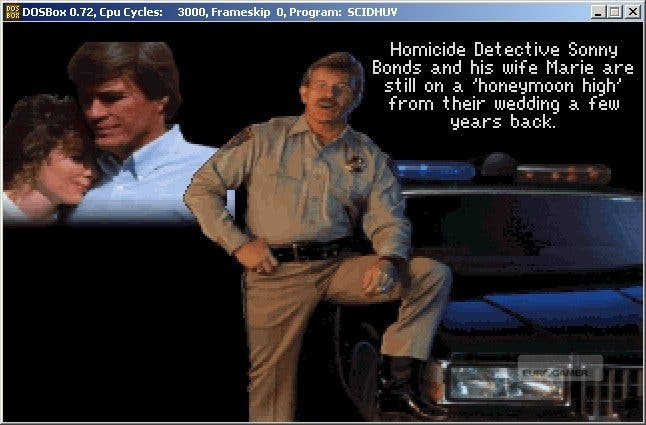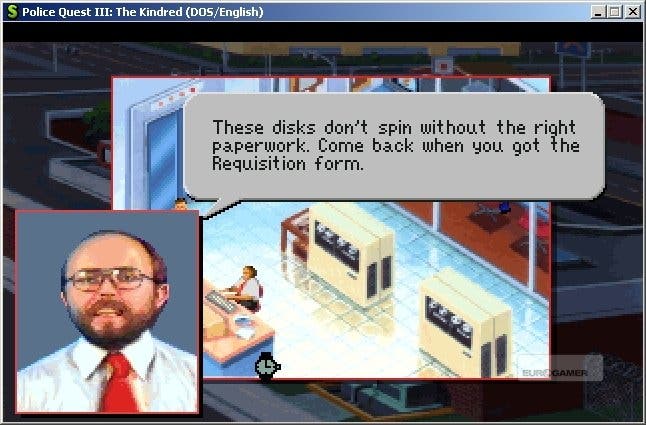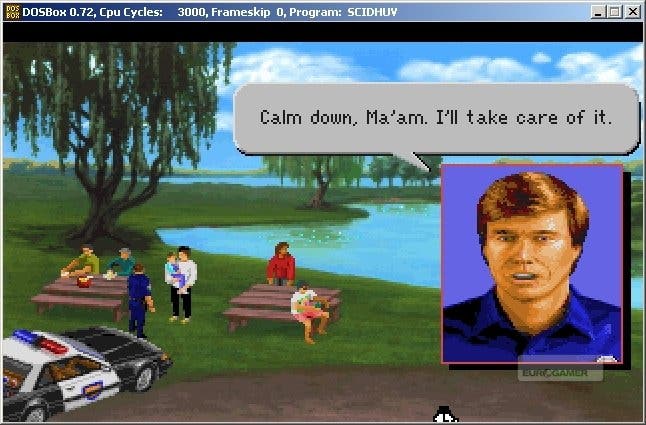Retrospective: Police Quest III: The Kindred
Violation #395.7: Clicking on a review link without clear signal.
And here's why I mentioned Halloween. Police Quest III was, out of nowhere, about a satanic cult. Each victim (bar your wife, who survived after the attackers were disturbed) has a pentagram carved into their torso. And later, perhaps infamously (and if you're concerned about spoilers for the 18-year-old game you'll never play, stop here), one rather enormous pentagram spelled out across the city's streets.
I mentioned Bonds' partner Morales. The first time you encounter her on traffic duty she's pissed off a pregnant woman so much that you - a superior officer - have to be called in. She's clearly trouble. So, er, she's also assigned to Homicide and you're told to work with her. So while her obvious badness isn't subtly indicated, there is a rather nice slow development of your suspicion.
Whenever you walk into the office she quickly locks her desk drawer. When the two of you arrive back at the station she'll always make an excuse to visit her car. And on a number of occasions she asks you to take her to the mall so she can make a phone call. It's on one of these occasions that you can nab the key from her purse, take it to the key cutters, and then later find out what's going on in that locked drawer.

Beyond that nothing makes a blind bit of sense with her. You find stolen cocaine in her locker, report it to your Captain, and he tells you he'll call Internal Affairs and to watch your back. Then, out of nowhere, you suspect she's affiliated with this satanic cult and do absolutely nothing about it. Her eventual attempted betrayal makes no sense, her connection with the gang goes unexplained, and indeed why a bunch of satanists were running drugs and performing serial murders becomes bewildering, especially when it somehow has something to do with former nemesis Jessie Bains' brother. My poor head.
But that pentagram. This, before I replayed the game this week, was the clear memory I had. I remembered really loving the game, I remembered it being very hard, but most of all I remembered the pentagram. Each murder site, when plotted on a computer map of the city, formed four points of a five-pointed star. With this information you could then predict the location of the fifth murder and hopefully prevent it.
But of course it absolutely stinking didn't work. Plotting the star correctly so the game would acknowledge it was horrendously hard. And once again I struggled, echoing the frustration of my 13-year-old self. Until I discovered a patch - a term I wasn't even aware of in 1991. But still, ignoring that, what a cool idea.

If it were a movie the cop would realise (either before or when it was too late) that it was only in discovering this fifth location that he was fulfilling its reality, and become the fifth murder victim by going there. If this is what PQ3 had in mind, it rather forgot to say so.
Instead you find a bar where the murderer attempts to shoot you, and then flees, eventually flipping his car on the highway and killing himself. So, um, what was that about it being the site of the fifth murder? But by then everything goes skewiff and you're tracing the cultists to their base and preventing their selling of drugs. It's something of a miracle they weren't dealing guns, running a prostitution ring, and smuggling sex slaves.
Clearly when I was 13 I was an idiot. There's just so much wrong with Police Quest III. But that didn't stop each new scene feeling like looking at old holiday photos. (Well, sort of. We spent more time in old castles or on the beach than in back alleys and dive bars. Oh, and there were fewer murders.) I think what the game reveals, more than anything else, is quite how much we've lost our ability to use manuals.

Quite reasonably I suspect, when a game fails to explain itself within itself we now criticise it. But there's something to be said for the reliance on a manual in PQ3. While the game does indeed feature some ridiculous random deaths (at one point you can literally "die of embarrassment"), an awful lot of the dead ends can be avoided simply by following procedure.
This reaches the tedious when you're putting each item of forensic equipment one by one into the case in the boot of your car before you're allowed to enter the evidence room to file your blood and hair sample (after entering the correct case numbers). But when it's about remembering to search a felon at the right time, so you don't get your neck stabbed, it feels quite sensible.
The game's story suggests lots of potential, and the writing throughout is strong. But its descent into incoherency and nonsense, and its failure to deliver anything interesting with the occult themes, means it's sadly a game that fails to conjure the charm that made other Sierra series be so fondly remembered. Police Quest III may not be that great, but it was at least interesting in how it was different.
